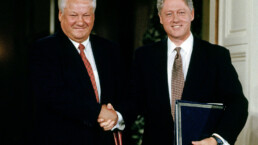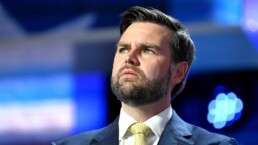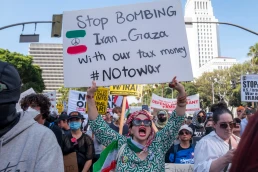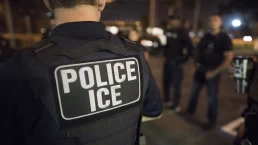Former Secretary of Defense William J. Perry looks back at our relationship with Russia and charts a way forward for peace.
By William J. Perry, Outrider
The hostility between the United States and Russia has reached heights not seen since the dark days of the Cold War. How have we found ourselves back here?
Former After the fall of the Soviet Union and the emergence of the Russian Federation in the early 90s, our two nations began working together towards building a cooperative alliance. Today, it feels as if that era of positive dialogue has been forgotten. Yet as we look at the terrible events unfolding with Russia’s brutal invasion of Ukraine, it is worth trying to understand how we found ourselves so far from those heady early days; not just to manage the current situation but also in the hopes that we can restore the relationship to something beyond open antagonism.

Many have pointed to the expansion of NATO in the mid-1990s as a critical provocation. At the time, I opposed that expansion, in part for fear of the effect on Russian-U.S. relations. But the larger issue was not just NATO expansion but what it represented: a general failure by Western governments to respect the vital importance of this nuclear power to the world order.
Before NATO expansion, our two nations were on track toward developing a relationship that could have resulted in a true global partnership. When I was Secretary of Defense in the early and mid-90s, I had a cooperative and cordial rapport with the Russian Minister of Defense, Pavel Grachev. We both made a concerted effort to build on this emerging relationship; I hosted Minister Grachev on visits to U.S. military bases, and he, in turn, hosted me at Russian bases. We conducted collaborative military and disaster relief exercises in Europe and Hawaii. I even brought Minister Grachev as a guest to several NATO meetings. We recognized that communication was critical between our two nations; each of us had a hotline on our desks that we could use to quickly work out any defense issues that might arise.
Recent Posts
Is A Citizens United 2.0 Right Around The Corner?
July 15, 2025
Take Action Now Is it possible for American democracy to be further degraded by the influence of billionaires? Thanks to champion of the working…
U.S. Leaders Gave Up On Diplomacy With Iran. We Must Make Them Return To It.
July 15, 2025
Take Action Now Building an antiwar movement means preventing the systemic U.S. aggression that creates the conditions for war.By Hanieh Jodat,…
What To Do When You See ICE In Your Neighborhood
July 14, 2025
Take Action Now How can you deter the Trump administration’s immigrant deportation machine when it pops up in your community? Follow these…
ICE Campaign Of Violence Will Lead To More Deaths
July 14, 2025
Take Action Now Jaime Alanis’s death shows the horrific consequences of a secret police force behaving with utter impunity.By Natasha Lennard, The…




